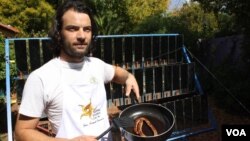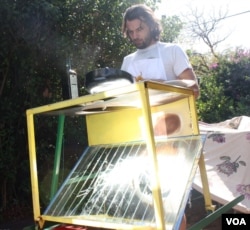Household pollution kills more than 4 million people each year.
Most of these fatalities are in the developing world, mostly in Africa. Many people die from inhaling smoke from cooking over wood or coal stoves.
Solar cookers could be the answer, and a pair of inventors in South Africa have made some improvements to the technology.
Ground zero for the initiative is the SunFire company in Johannesburg.
Moving a big metal frame with a panel of 48 mirrors attached to it, Sunfire’s solar power technologist Crosby Menzies describes the contraption.
“It is four square meters of mirrors, six to eight meters in length; it is quite a large cooker. We are very pleased to have built the first one in South Africa,” Menzies says.
Menzies’ partner, Zander van Manen, tilts the mirrors with a lever, until they are bouncing sunlight off another slab of mirrors, up to a point under a frying pan.
Within two minutes, the sunlight heats the pan to a point that its contents – sausages and onions – are sizzling away.
Generates heat
Menzies says the Sol4 solar cooker is special because it generates extreme heat very fast.
“In four minutes you will have boiling water. So it is actually comparable to cooking on gas or electricity,” he says.
Menzies says the device is “much friendlier” than other solar cookers, which force people to stand in the hot sun.
The Sol4 allows users to cook in the shade, on a table, with only the mirrors being exposed to the sun.
Menzies says wherever he has demonstrated his solar cookers people have doubted they work until they see the sun cooking their food, and the word is spreading.
"We have got literally hundreds of them going out in South Africa. We have got a project coming up in Mali, a project in Ethiopia, and another project in Uganda. I have just come back from (demonstrating the Sol4 in) Zambia. The technology really is viable. A lot of people still do not know that it works and we are working as hard as we can to change that,” he says.
Menzies says the major attraction for people is that preparing meals with the sun means they no longer have to collect firewood and buy expensive coal or paraffin to cook with. Therefore, they are much less likely to develop potentially fatal respiratory diseases.
Versatile
Menzies says the Sol4 is also able to cook for many people at once.
“Being that it is so big, it is not the kind of model that you want to move around too often. It is more of a permanent installation, and the places where we see a permanent need for cooking day after day are schools, orphanages, old age homes, or anywhere where there is a need for large-scale cooking: soup kitchens, church groups," he says.
Van Manen, Menzies’ partner, says the cooker only works if the sun is shining. But he adds he is working on something he calls a “magic stone,” a slab of compressed salt, to address the issue.
“This would be at the end of the day our 'battery.' ... What this will do is it will take the stored sunlight, and it will store it as heat. And you can then put it in a heat-retaining bag or in a heat-retentive space, and then whenever you need it at night you can take it out and it will actually radiate heat where you can then cook on or boil water,” van Manen says.
"Essentially you would end up with a mobile hot plate,” Menzies adds.
For now, each cooker costs more than $2,000, putting it far out of reach of most Africans. But Menzies says NGOs across the continent are stepping in to finance Sol4s for vulnerable groups.






